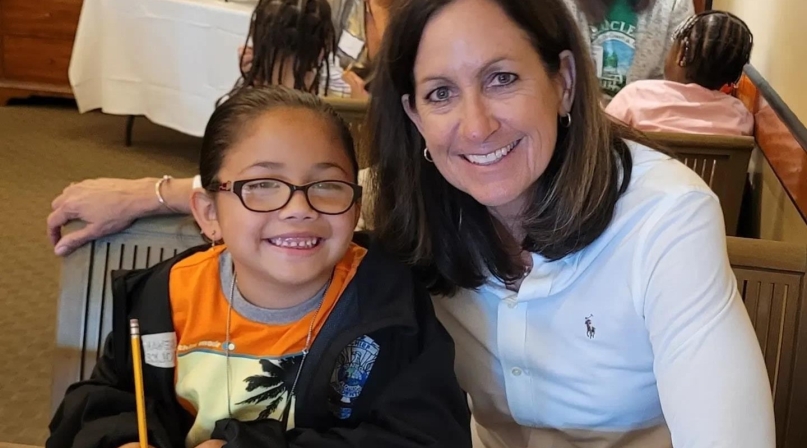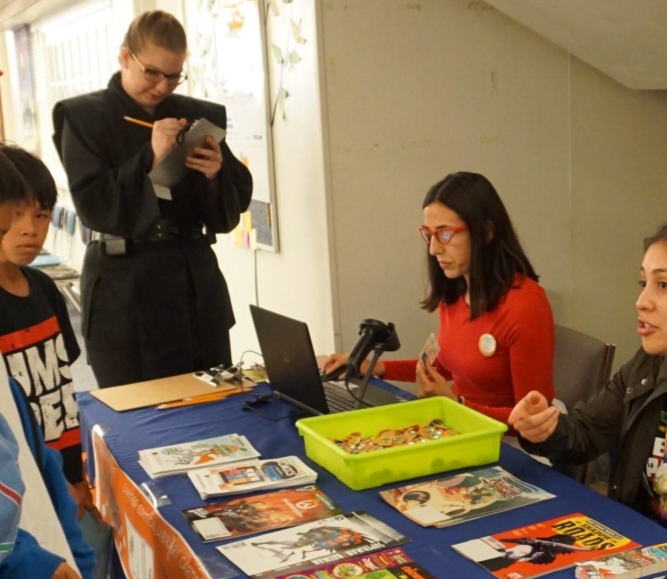County reading program prevents ‘summer slide'

Key Takeaways
Aralyn, a rising second-grader, and Jonathan, a county employee, sit next to each other in a booth. They wash down French toast and bacon with orange juice as they learn about Mr. Fish’s case of the can’t-sleep blues.
“Late one evening in the inky ocean deep, Mr. Fish blub-blubbed: ‘Oh, I can’t get to sleep!’” Aralyn reads aloud.
Jonathan Clendenon is Aralyn’s mentor in the Dive into Reading program, where summer school students are paired with volunteers; the pair share a meal and read together weekly. Dive into Reading is a partnership between the Manatee County, Fla. Library, Manatee County Schools and local restaurants.
In Manatee County, only 53% of students read on grade level by the end of third grade, about 14% below the national level. The 47% of third graders who aren’t proficient readers are four times less likely to graduate high school than their peers who read at or above grade level, according to Manatee County Schools data.
Studies show that under-resourced children are at a higher risk of falling behind in reading, particularly over the summer months when school isn’t in session. Students from lower socioeconomic backgrounds lose two to three months of reading proficiency each summer, which is commonly referred to as “the summer slide” in the early education community.
Dive into Reading is helping youth curb that “summer slide.” Children who participate in the program maintain their reading proficiency or come back to school in August at a higher level than when they left for the summer, according to Manatee County Schools data.
John and Amanda Horne, the owners of Anna Maria Oyster Bar in Manatee County, created the program in partnership with the Manatee County Library seven summers ago. In addition to making strides in their reading development, students are also shown etiquette, such as how to hold a fork or what to do with a napkin.
“They wanted a way to give back to the community and introduce kids to being in a sit-down restaurant,” said Jodie Williams, Manatee County Library’s community engagement coordinator. “Many of them come from a lower socioeconomic background and that is just something they haven’t done.”
When Dive into Reading first launched in summer 2017, 76 students from two local elementary schools participated; this year, roughly 550 students are participating across 15 Manatee County Schools. The library works with the school district to bus students to the reading sessions, according to Williams.
The success of Dive into Reading shows how libraries can be connectors and serve as a crucial resource for counties, especially in the wake of COVID-19’s impact on literacy rates, Williams said.
“In the four years or so leading up to COVID, all of these efforts were making gains in student literacy, and it might only be a percentage point per year, but it was still trending up,” Williams said. “Since COVID, those numbers fell back down, and children from less advantaged neighborhoods were hit the hardest, across the nation.”
Once a mentor is paired with a student, they create a goal together for the summer, which can look different depending on the student’s level of reading, according to Williams. Some students aim to read a certain number of books, while others focus on mastering what she refers to as “high frequency” words, which are words commonly used in writing, such as “about” or “saw.”
Beyond a pair working through the reading together, Dive into Reading includes a section on reading comprehension, and students are prompted to share what they took away from their book. Aralyn deduced that in “The Pout-Pout Fish and the Can’t-Sleep Blues,” Mr. Fish was finally able to fall asleep, because he did it on his own terms.
“At the end of the book, the fish realized that he had to take all the input from the animals and come up with his own plan on how to fall asleep,” Clendenon said. “She was able to dissect the actual meaning behind the book, which I thought was really neat.”
Many of the students are shy or nervous when they first get paired with a mentor, but because they meet with the same person weekly, they often form a close bond, Williams said.
“When the students come back for a second time, and they get off the bus, their faces are lit up,” Williams said. “It’s not often that they get a chance to get someone’s undivided attention for an hour and a half and get to be supported and motivated and feel connected with an adult like that.”
At the end of last summer, a boy who Rose Pallares mentored created a handmade thank-you card for her.
“It’s so fulfilling,” Pallares said. “It was just amazing the feeling at the end, when he knows you by first name and gives you a hug every time. It’s just wonderful.”
This year is Pallares’ fifth summer serving as a Dive into Reading mentor. She said she keeps coming back because it makes her feel closer to the community.
“Books always seemed to catch my attention and I always preferred them to toys,” Pallares said. “My sisters would always say ‘Hey, I’ll get you a book if you play dolls with us or let us put makeup on you.’”
Although reading has always been an integral part of Pallares’ life, she didn’t participate in library summer programming growing up, because her parents aren’t native English speakers and weren’t aware of the resources libraries can provide, she said.
Dive Into Reading has opened up all of the resources the library has to offer, Williams said. Many continue to come to the library after being involved with the program, she added.
“We’re looking at people who have time barriers, who have transportation barriers and who have maybe limited understanding of the library,” Williams said.
“Especially those whose parents are immigrants from other countries where public libraries don’t exist and they’re very busy working hard to put food on the table, so it’s something that has helped bring a new set of patrons to the library, as well.”
Related News

Celebrate Procurement Month by honoring county procurement professionals
As we celebrate Procurement Month, we honor the unsung heroes of public service — procurement professionals — who ensure counties have the resources they need to serve their communities.

DOJ issues final rule for state and local governments to implement web-based accessibility standards
On April 8, the U.S. Department of Justice (DOJ) announced the release of a web accessibility final rule for state and local governments.

County Countdown – April, 22, 2024
Every other week, NACo’s County Countdown reviews top federal policy advocacy items with an eye towards counties and the intergovernmental partnership.
County News
Pop-up libraries find new ways to promote services, improve outreach

